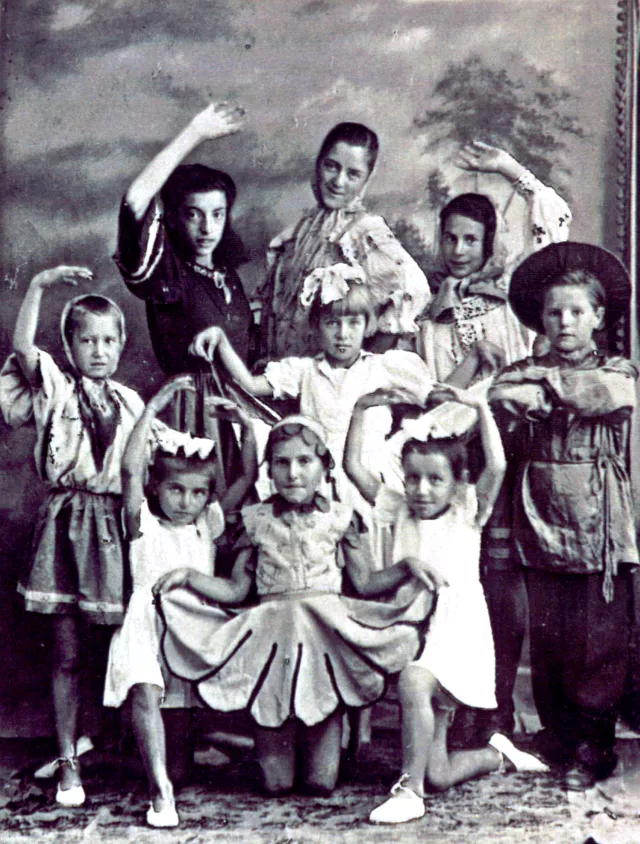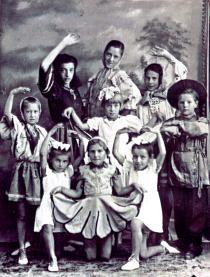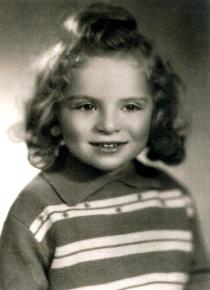Ida Goldshmidt and her schoolmates at the children's home in Ivanovo
This is performance of our dancing ensemble at the children's home in Ivanovo where I was during the war. I'm the 1st on the left in the 3rd row. My friend Feiga Pesachovich is the 1st on the right in the 3rd row. Her older sister Matlia is in the center of the 3rd row, and Genia, the younger sister, is the 1st on the right in the 1st row. These are all children I remember. The rest of them are younger children, with whom we didn't communicate. This photo was taken in Ivanovo in 1944.
In early June 1941 I finished the 2nd grade and my brother finished the 4th grade. We usually spent summer vacations at home. Our parents couldn't afford to arrange vacations elsewhere for us. In June 1941 Soviet authorities established a pioneer camp for children in Ogre. Children from poor families could go there on summer vacation. My brother and I were also to spend the summer there. We were looking forward to going to the summer camp, and our parents were very happy that we would have decent vacations.
We were busy in the camp. There were clubs, and also, we went to the woods or to bathe. My brother and I were in different pioneer groups, and didn't see each other often. Sunday was the day of parents' visits. Our parents visited us once. They brought us sweets and candy. The following Sunday was to be 22nd June We heard distant explosions in the morning. We ignored them. There were frequent military trainings, and we were used to such noises. Later we noticed that adults looked concerned about something. In the late afternoon German planes attacked the camp. We were hiding in the forest during this air raid. At night evacuation of the camp began. We headed to the railway station where we boarded freight carriages.
Our train, full of children, was moving to Russia. Regretfully, I cannot remember the places where we stopped. There were many stops. I knew no Russian, and could not remember Russian names. When the train stopped in a village or town, we got off, if there was an opportunity for us to stay for some time at school buildings or in local houses. In 1943 our former pioneer camp and current children's home arrived at Ivanovo. There was an international children's home, known all over the Soviet Union located there. It was established in 1936 or 1937, during the war in Spain, when Spanish orphan children started arriving in the Soviet Union. Then Polish children, whose parents were killed, when Hitler attacked Poland in 1939. There were children from Hungary, Czechoslovakia, and when the Great Patriotic War began, Soviet children were also brought to the children's home as well.
In Ivanovo we attended Russian classes. Children learn fast. All children of different nationalities spoke Russian to one another in this international children's home. We faced no anti-Semitism in the children's home. There were so many different children at this home, that nobody looked foreign. Of course, life in the children's home was no idyll, and I would never believe those who say they were happy there. However, we knew we had no alternative, and that we would have died, if it had not been for the children's home. Actually, we had sufficient food and clothes, we studied, had clean beds and were treated all right. I was continuously ill in Ivanovo. The doctors really saved my life at the children's home. I became a pioneer at the children's home, and I was very proud of it. I studied from the 3rd to the 5th form at school at the children's home. I was doing all right at school. I had friends there.















